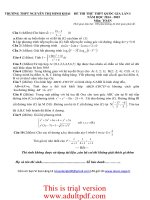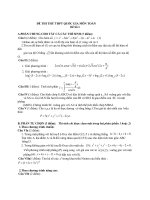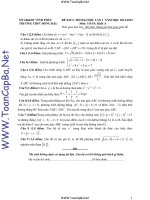- Trang chủ >>
- Đề thi >>
- Đề thi lớp 9
Tải Đề thi thử THPT Quốc gia môn Tiếng Anh năm 2017 có đáp án + giải thích chi tiết (Đề luyện 10) - Đề thi Đại học môn Tiếng Anh năm 2017 có đáp án
Bạn đang xem bản rút gọn của tài liệu. Xem và tải ngay bản đầy đủ của tài liệu tại đây (540.54 KB, 9 trang )
<span class='text_page_counter'>(1)</span><div class='page_container' data-page=1>
<b>ĐỀ LUYỆN 10</b> <b>ĐỀ THI THỬ THPT QUỐC GIA NĂM</b>
<b>2017</b>
<b>MÔN THI: TIẾNG ANH </b>
<b>Thời gian: 60 phút</b>
<i><b>Mark the letter A, B, C, or D on your answer sheet to indicate the word whose underlined part </b></i>
<i><b>differs from the other three in pronunciation in each of the following questions. </b></i>
Question 1. A. exact B. examine C. eleven D. elephant
Question 2. A. pressure B. assure C. assist D. possession
<i><b>Mark the letter A, B, C, or D on your answer sheet to indicate the word that differs from the </b></i>
<i><b>other three in the position of the primary stress in each of the following questions. </b></i>
Question 3. A. alcohol B. comment C. chemical D. proceed
Question 4. A. historian B. architecture C. biography D. thermometer
<i><b>Mark the letter A, B, C. or D on your answer sheet to indicate the word or phrase CLOSEST in</b></i>
<i><b>meaning to the underlined word(s) in each of the two following questions. </b></i>
Question 5. The newscaster gave a concise account of the strategy.
A. complicated and intricate B. short and clear
C. sad and depressing D. long and detailed
Question 6. Fruit is customarily treated with sulfur prior to drying to reduce any color change.
A. previous to B. at the time of C. in front of D. subsequent to
<i><b>Mark the letter A, B, C, or D on your answer sheet to Indicate the word or phrase OPPOSITE </b></i>
<i><b>in meaning to the underlined word(s) in each of the two following questions. </b></i>
Question 7. Affluent families find it easier to support their children financially.
A. Wealthy B. Well-off C. Privileged D. Impoverished
Question 8. Synthetic products are matte from chemicals or artificial substances.
A. natural B made by machine C. man-made D. unusual
<i><b>Mark the letter A, B, C, or D to indicate the underlined part that needs correction in each of </b></i>
<i><b>the following questions. </b></i>
Question 9. The science and technology industries have grown up steadily over the last decade.
A. science B. have grown up C. steadily D. last decade
Question 10. Originated in Ethiopia, coffee was drunk in the Arab world before it came to Europe
in the 17th<sub> century </sub>
A. Originated B. was drunk C. came D. in
Question 11. The swirling winds of a tornado can reach quickly speeds close to 300 miles per
hour.
A. swirling winds B. reach quickly C. close to D. per hour
<i><b>Mark the letter A, B, C, or D on your answer sheet to indicate the correct answer to each of the</b></i>
<i><b>following questions. </b></i>
Question 12. I will come and see you before I _______ for America.
A. leave B. will leave C. have left D. left
Question 13. Politicians _______ blame the media if they don’t win the election. They’re so
predictable.
A. variable B. variety C. various D. invariably
Question 14. The investment has had _______ on the development of our project.
A. results B. progress C. effects D. interruptions
</div>
<span class='text_page_counter'>(2)</span><div class='page_container' data-page=2>
Question 16. She got the job ________ the fact that she had very little experience.
A. although B. because of C. despite D. because
Question 17. When the first child was born, they ________ for three years.
A. have been married B. had been married
C. will been married D. will have been married
Question 18. He would win the race if he _______ his brothers example and trained harder.
A. repeated B. set C. answered D. followed
Question 19. She’s finished the course, ________?
A. isn’t she B. doesn’t she C. didn’t she D. hasn’t she
Question 20. “Excuse me. Where is the ______ office of OXFAM located?”
A. leading B. head C. central D. summit
Question 21. The boy was always getting ______ trouble as a youth. Then, to everyone’s
surprise, he became a policeman.
A. into B. onto C. on D. with
Question <i>22. </i>_________ for farming purposes, soil must contain the minerals plants require.
A. To be good B. Being good C. Be good D. That’s good
Question 23. My grandfather passed ________ when I was only six years old. He had lung
cancer.
A. out B. over <i>C. </i>away D. off
<i><b>Mark the letter A, B, C, or D to indicate the most suitable response to complete the following </b></i>
<i><b>exchanges. </b></i>
Question 24. “How about an evening riverboat tour?” - “________ “
A. No, it’s good to do so.
B. Actually I’ve never gone on an evening riverboat tour.
C. No, I’ve never gone an evening riverboat tour.
D. Actually I’ve gone twice this week.
Question 25. “Can you come over after the show?” - “________ “
A. That would be nice. B. No, I didn’t.
C. Please, go ahead. D. Why don’t we go to the show?
<i><b>Mark the letter A, B, C, or Don your answer sheet to indicate the sentence that is closest in </b></i>
<i><b>meaning to each of the following sentences. </b></i>
Question 26. <i>“I wais not there at the time,” he said. </i>
A. He denied to have been there at the time.
B. He denied that he had not been there at the time.
C. He denied to be there at the time.
D. He denied having been there at the time.
Question 27. <i>“Let’s </i>go <i>out for a walk now,” he suggested. </i>
A. He suggested going out for a walk then.
B. He suggested to go out for a walk then.
C. He suggested them to go out for a walk then.
D. He suggested them going out for a walk then.
Question 28. <i>“You broke my glasses,” said the woman to </i>me.
A. The woman blames me of breaking her glasses.
</div>
<span class='text_page_counter'>(3)</span><div class='page_container' data-page=3>
<i><b>Mark the letter A, B, C, or D on your answer sheet to indicate the sentence that best combines </b></i>
<i><b>each pair of sentences in the following questions. </b></i>
Question 29. <i>We started out </i>for <i>California. It started to ruin right after that. </i>
A. No sooner did we start out for California than it started to rain.
B. No sooner had we started out for California when it started to rain.
C. No sooner had it started to rain than <i>we </i>started out for California.
D. No sooner had we started out for California than it started to rain.
Question 30. <i>We have been friends for years. It </i>is <i>quite easy to share secrets between us. </i>
A. having been friends for years, we find quite easy to share secrets between us.
B. We have been friends for years so that it is quite easy to share secrets between us.
C. Being friends for years, we find it quite easy to share secrets between us.
D. We find it quite easy to share secrets, being friends.
<i><b>Read the following passage and mark the letter A, B, C, or D on your answer sheet to indicate </b></i>
<i><b>the correct word or phrase that best fits each of the numbered blanks from 31 to 35. </b></i>
A GOOD START TO A HOLIDAY
I had never been to Denmark before, and when I set out to catch the ferry in early May, I little
(31) _______ that by the end of the trip I’d have made such lasting friendships.
I wanted to use my time well, so I had planned a route which would (32) _________ several
small islands and various parts of the countryside. I arrived at Eshcrg, a convenient port for a
cyclist’s arrival, where tourist information can he obtained and money changed. A cycle track
(33) _______ out of town and down to Ribe, where I spent my first night.
In my experience, a person travelling alone sometimes meets with unexpected hospitality, and
this trip was no exception. in Ribe, I got into conversation with a cheerful man who turned (34)
_______ to be the local baker. He insisted that I should join his family for lunch, and, while we
were eating, he contacted his daughter m Odense. Within minutes. he had (35) ________ for me
to visit her and her family. Then I was sent on my way with afresh loaf of bread to keep me
going, and the feeling that this would turn out to be a wonderful holiday.
Question 31. A. wondered B. suspected C. doubted D. judged
Question 32. A. include B. contain C. enclose D. consist
Question 33. A. leads B. rides C. moves D. connects
Question 34. A. up B. out C. in D. over
Question 35. A. arrange B. fixed C. settled D. ordered
<i><b>Read the following passage and mark the letter A, B, C, or D on your answer sheet to indicate </b></i>
<i><b>the correct answer to each of the questions from 36 to 42. </b></i>
</div>
<span class='text_page_counter'>(4)</span><div class='page_container' data-page=4>
friends.
I have only one grandmother left still living. She is in pretty good health even at the age of
seventy-eight so she still lives in her own fiat. I enjoy spending time with her when I can. Both
my grandfathers died from cancer because they were smokers, which was really a great tragedy
because I didn’t get chance to know them. My other grandmother died just a few years ago. I also
have a lot of aunts, uncles, and cousins. The cousin I’m closest to is my uncle’s daughter Pauline.
We have a lot in common because we are both eighteen and so we are good friends.
My parents have assigned me certain duties around the house. I don’t mind helping out because
everyone ma family should contribute in some way. I help with the washing up, the vacuuming
and the shopping. Of course I also have to help keep my room tidy as well. My brother is
responsible for the dusting and mopping. lie also has to clean his own room. Even though my
brother and I sometimes fight about who has to do what job, we are still very close. I am also very
close to my parents and I can rely on them to help me. My parents work together to keep our
home well maintained and it seem they always have a project or another that they are working on.
They respect each other’s opinions and even it they disagree they can always come to a
compromise. I hope in the future that I have a family like ours.
Question 36. What tines the writer’s father do?
A. a cashier B. an accountant C. a receptionist D. a writer
Question 37. What does the writers mother look like?
A. She is slim and small B. She is small and has grey hair
C. She has blue eyes D. She has long brown hair.
Question 38. What does the writer’s brother do?
A. a computer programmer B. a high school student
<i>C. </i>a college student D. a football player
Question <i>39. </i>What happened to the writer’s grandfathers?
A. They died because they smoked too much.
B. They got lung cancer a few years ago.
C. They had to leave their own fiat.
0. They had an accident and died.
Question 40. The word “tragedy in the third paragraph mostly means
A. bad luck B. sudden accident C. sad event D. boring result
Question 41. The word ‘assigned” in the fourth paragraph mostly means ________
A. allowed B. appointed C. forced D. encouraged
Question 42, Which of the folowing statements is NOT true?
A. The writers mother likes travelling.
B. One of the writer’s grandmothers is living with her.
C. The writer’s brother has to clean his own room.
D. The writer has a cousin whose age is the same as hers.
<i><b>Read the following passage and mark the letter A. B, C, or D on your answer sheet to indicate </b></i>
<i><b>the correct answer to each of the questions from 43 to 50. </b></i>
</div>
<span class='text_page_counter'>(5)</span><div class='page_container' data-page=5>
educational opportunities as men. This aspect of’ Platonic philosophy, however, had little or no
effect on education for many centuries, and the concept of a liberal education for men only which
had been espoused by Aristotle, prevailed.
In ancient Rome, the availability of an education was gradually extended to women, but they
were taught separately from men, The early Christians and medieval Europeans continued this
trend, and single-sex schools for the privileged classes prevailed through the Reformation period.
Gradually however, education for <i>women </i>on a separate but equal basis to that provided for men
was becoming a clear responsibility of society. Martin Luther appealed for civil support of
schools for all children. At the Council of Trent in the 16th century, the Roman Catholic Church
encouraged the establishment of free primary schools for children of all classes. The concept of
universal primary education, regardless of sex, had been born, but it was still in the realm of the
single-sex school.
In the late 19th<sub> and early 20th centuries, co-education became a more widely applied principle of</sub>
educational philosophy, in Britain, Germany. and the Soviet Union the education of boys and
girls in the same classes became an accepted practice. Since World War II, Japan and the
Scandinavian countries have also adopted relatively universal co-educational systems. The
greatest negative reaction to coeducation has been felt in the teaching systems of the Latin
countries, where the sexes have usually been separated at both primary and secondary levels,
according to local conditions.
A number of studies have indicated that girls seem to perform better overall and in science in
particular in single-sex classes: during the adolescent years, pressure to conform to stereotypical
female gender roles may disadvantage girls in traditionally male subjects, making them reluctant
to volunteer for experimental work while taking part in lessons. In Britain, academic league tables
point to high standards achieved in girls’ schools. Some educationalists therefore suggest
segregation of the sexes as a good thing, particularly in certain areas, and a number of schools arc
experimenting with the idea.
Question 43. Ancient education generally focused its efforts on _______
A. male learners B. both sexes
C. female learners D. young people only
Question 44. Education in early times was mostly aimed at _________-
A. teaching skills B. learning to live
C. learning new lifestyles D. imparting survival skills
Question 45. The first to support the equality of the sexes was _______.
A. the Chinese B. the Greek C Plato D. the Jews
Question 46. The word “informally” in this context mostly refers to an education occurring
______.
A. in classrooms B. outside the school C. in a department D. ability
Question 47. When education first reached women, they were ________
A. locked up in a place with men B. isolated from normal life
C. deprived of opportunities D. separated from men
Question 48. When the concept of universal primary education was introduced, education
_______
A. was given free to all B. was intended for all the sexes
</div>
<span class='text_page_counter'>(6)</span><div class='page_container' data-page=6></div>
<span class='text_page_counter'>(7)</span><div class='page_container' data-page=7></div>
<span class='text_page_counter'>(8)</span><div class='page_container' data-page=8></div>
<span class='text_page_counter'>(9)</span><div class='page_container' data-page=9></div>
<!--links-->









